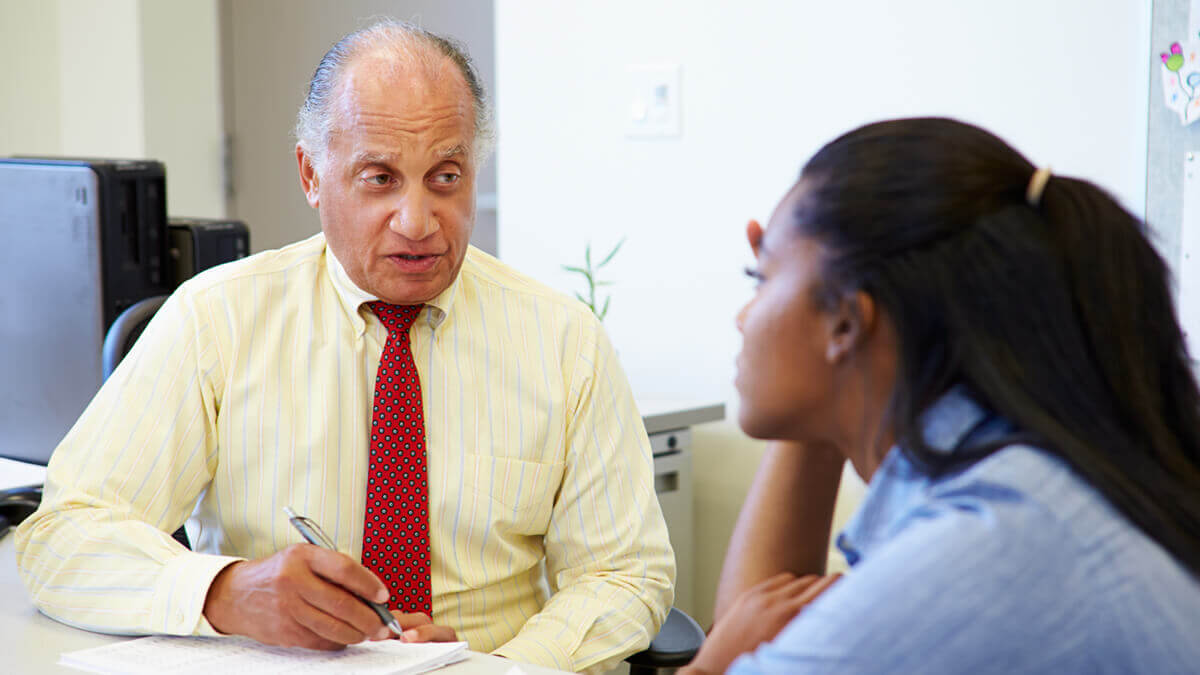There are currently about 15.3 million students in grades 9 through 12 in U.S. schools1 grappling with growth, decisions, disappointment, obstacles, pending financial decisions, testing, endless choices to make, and, of course, the unknown. High school years are transformative; as students transition into adulthood and separate from their parents, they explore and define their independence. In addition, teenagers are navigating an increasingly diverse and mobile society with new technologies and expanding opportunities. Through these challenging adolescent times, school counselors are an enormous source of support.2
The once-familiar term “guidance counseling” has become passé. Guidance counselors are now referred to as professional school counselors, which more accurately reflects their role as they provide academic, personal, and developmental support to all school-age children. Professional school counselors who work with high schoolers are known to provide information about choosing and applying for colleges, training programs, financial aid, internships, and apprenticeships. To achieve this, counselors are called upon to help discover and cultivate students’ talents and interests.
Too often, some high school students focus on their shortfalls as opposed to their strengths, and unfortunately social media has the ability to magnify the difference. As professional counselors with a mental health background, school counselors are uniquely qualified to help all students navigate the negative by focusing on the positive. By guiding them through this time of self-discovery, school counselors can help students examine their strengths, skills, and abilities, and even uncover new opportunities for growth and positive change.
Maurice Elias, professor of psychology at Rutgers University, says there are three ways school counselors can help students identify those talents and passions hidden within:
- Ask students about their hobbies or other things they really like to do.
- Ask students to talk about times when they discovered something surprising and good about someone else.
- Have students talk to their parents or guardians about interests or goals they might have pursued in the past but didn’t end up following through with.3
School counselors work with all students in an effort to help them identify favorite subjects and activities and match these with potential career opportunities. School counselors use career assessments, degree plans, and focused paths of study to help students identify potential career paths.
High school graduation rates have been growing steadily since 1996 and are projected to continue through at least 2027.4 With this growth comes an increased need for knowledgeable and experienced school counselors. In fact, the Bureau of Labor Statistics reports projected job growth of 8% from 2018 to 2028 and a median annual school counselor salary of $56,310.5
How to Become a School Counselor
If you decide you want to work in a high school setting, then choose a master’s degree in school counseling. In this type of program, you can learn the fundamentals of the career counseling profession, including its history, philosophy, and theoretical foundations, while gaining the advanced skills necessary to empower youth to make smart decisions about their education and lay the groundwork for bright futures.
Most states require a master’s degree in school counseling or a related field, such as a career counseling degree, and a state-issued license. When deciding on an MS in School Counseling program, look for an online counseling degree that will prepare you to work with diverse student populations and work toward positive social change with an intentional focus on equality for all, such as the MS in School Counseling offered by Walden University, which is accredited by the National Council for Accreditation of Teacher Education (NCATE). This CACREP-accredited program offers an optional accelerated track and multiple specializations.
If you are unsure of what turns your career path might take, you may wish to consider earning Walden’s MS Dual Degree in Clinical Mental Health Counseling and School Counseling degree. Upon successful graduation, you will have earned two degrees from an accredited program and be able to pursue licensure or certification as both a mental health counselor and a school counselor.
Expand your own career options by earning an MS in School Counseling. The convenient, flexible online format is designed to fit your busy lifestyle.
1Source: https://nces.ed.gov/fastfacts/display.asp?id=372#PK12_enrollment
2Source: https://www.schoolcounselor.org/asca/media/asca/Careers-Roles/WhyHighSchool.pdf
3Source: www.edutopia.org/blog/students-strengths-passions-maurice-elias
4Source: https://nces.ed.gov/pubs2018/2018019.pdf
5Source: https://www.bls.gov/ooh/community-and-social-service/school-and-career-counselors.htm
Walden University is accredited by the National Council for Accreditation of Teacher Education (NCATE). This accreditation covers initial teacher preparation programs and advanced educator preparation programs. As a recognized standard of excellence in professional education for the preparation of teachers, administrators, and other preK–12 school professionals, NCATE accreditation ensures that the institution has met rigorous national standards set by the profession and members of the public. However, the accreditation does not include individual education courses offered to preK–12 educators for professional development, relicensure, or other purposes.
Note on Licensure
The MS in School Counseling program is offered by Walden University, an institution accredited by the National Council for Accreditation of Teacher Education (NCATE), which is a requirement to practice as a school counselor in some states. The MS in School Counseling program meets the standards for school counseling licensure or certification and is a state-approved program in Minnesota and Ohio. The MS in School Counseling program is accredited by the Council on Accreditation of Counseling and Related Educational Programs (CACREP), a specialized accrediting body recognized by the Council for Higher Education Accreditation (CHEA), which also may be a requirement to become licensed or certified as a school counselor in some states. In addition, some states require school counselors to have an existing teaching license or certification, and teaching experience, in order to be eligible for a school counseling certification/license.
Further, many states require school counseling programs to be approved in at least one state, either their own or another state. The MS in School Counseling program is approved by the states of Minnesota and Ohio, and while this approval is accepted by the majority of states that require state approval, it may not be accepted by all states.




